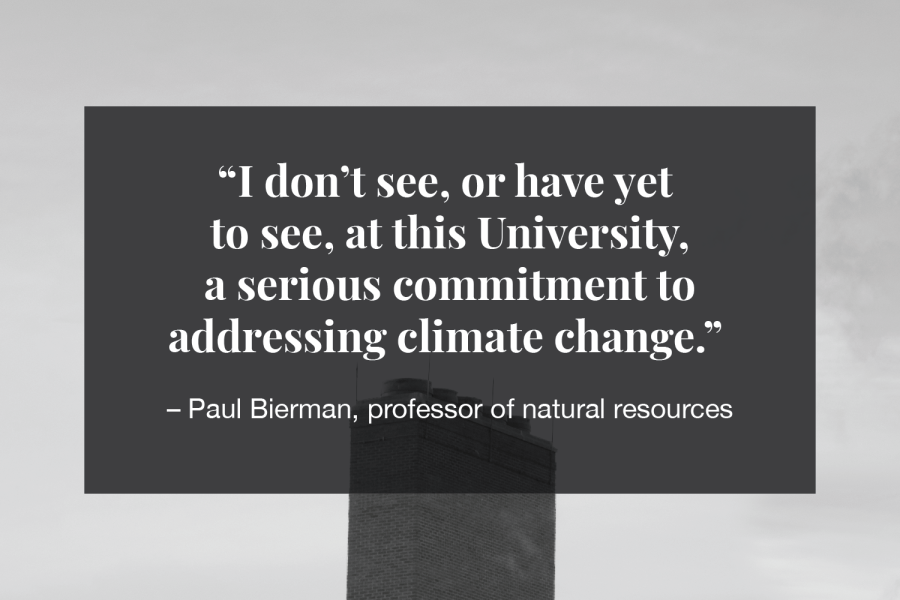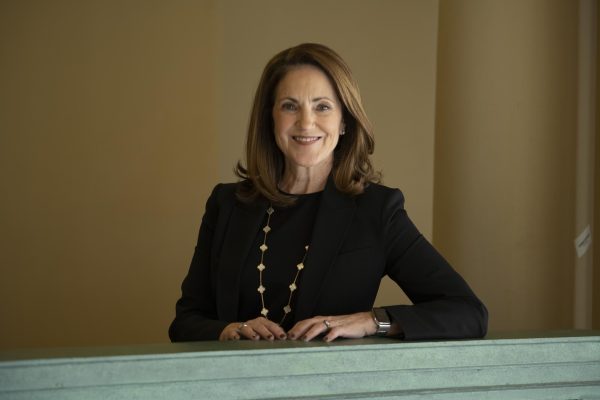UVM to keep indirect investments in fossil fuels until contracts lapse
Editor’s note: This story was updated March 18 at 12:49 p.m. to correct information about the trustee appointment process.
UVM will continue to invest in multiple private equity investments linked to fossil fuels for the next five years despite announcing divestment from direct fossil fuels nearly two years ago, according to the University website.
UVM announced its decision to discontinue renewal of four remaining private investments July 14, 2020, according to the University website. The University exited one private equity investment linked to fossil fuels so far, an action which the terms of that particular contract allowed, according to the email.
However, the University remains contractually legally obligated to remain in four indirect fossil fuels investments until the contracts lapse in 2027, according to a Feb. 25 email from UVM Spokesperson Enrique Corredera. The remaining investments amount to a total value of $157,000.
A private equity investment consists of investing in a fund managed by a private equity firm and are often long-term investments typically of ten or more years, according to Investor.gov.
Information about the names of the fossil fuel companies and dollar amounts within each company’s contracts is not publicly available, according to a March 11 email from Corredera.
These remaining investments now contribute to 0.02% of the endowment, according to the March 11 email.
“Unfortunately, when we were looking at precedents from other schools it does seem like these timelines are often not the most swift,” said Organize President David Sidelle, a senior. “They go for 10 to 15 years, which is really unfortunate.”
UVM community members formed Organize in 2019 with the initial goal for UVM to divest its endowments from fossil fuel companies and pushed for the change during an Oct. 25-26 2019 board of trustees meeting, according to an Oct. 23 2019 Cynic article.
The University completely backed out of all direct fossil fuel investments as of Feb. 28, 2021, according to the email.
“I don’t see, or have yet to see, at this University, a serious commitment to addressing climate change,” said Paul Bierman, professor of natural resources. “The divestment piece is a great start. It sends a signal, but I don’t see us moving aggressively in that direction,”
In fall 2019, a few students from Organize approached Bierman after one of his climate classes and asked if he would help their goal of fossil fuel divestment and to attend an upcoming board of trustees meeting, he said.
After attending the board of trustees meeting in October 2019, Bierman noticed a lack of diversity represented on the board, which he thinks could contribute to the University’s lack of motivation to divest, he said.
“I’m horribly cynical about this administration, they do what looks good,” Bierman said. “They put Enrique up in front of everything. Some of my students would call it greenwashing. I don’t know if it’s quite that bad. But sometimes it is, they do things that look nice.”
Greenwashing refers to a company falsely displaying itself as environmentally friendly and sustainable to seem more appealing, according to an Oct. 17, 2015 New York Times article.
“I think at this point, the statement has been made by getting out of direct fossil fuels and that’s a good thing,” Bierman said. “But now it’s time for the University to roll up their sleeves and actually cut their fossil fuel use.”
Bierman said the change in carbon emissions should come from UVM trying to moderate its fossil fuel use, which includes upgrading buildings, efficiency and discouraging any excess travel of faculty and students.
Some buildings on campus, such as the Davis Center, are certified in Leadership in Energy and Environmental Design, which monitors the construction process of buildings to be more sustainable, according to the University website.
Sidelle suggests the University stick to its former Climate Action Plan and focus on reaching net carbon neutrality by 2025, he said.
The University passed the Climate Action Plan in 2010, which pledged to reach carbon neutrality in electricity production by 2015, in thermal energy production by 2020 and commuting, business and air travel by 2025, according to an April 9, 2021 Cynic article.
The Office of Sustainability sent out an email with updated goals Oct. 2021, which are set to be finalized by the end of June, according to an Oct. 18 email.
Sidelle thinks UVM’s heating would need to move to a renewable source of energy, they said.
“I think the reason we have a problem with the board that doesn’t divest is that you have a bunch of older white males, mostly businessmen, on there,” Bierman said. “If we really want to divest UVM, the trick is to make the board look more like the world.”
The disproportionate representation on the board is a product of the way in which board members are elected, which is not by a democratic process, Sidelle said.
The Vermont General Assembly elects three members in odd-numbered years and a self-perpetuating board elects three members in even-numbered years, while the Governor appoints one trustee every odd-numbered year, according to the UVM website. One student is appointed annually.
Trustees Coordinator Corrine Thompson declined the Cynic’s request for comment from the board of trustees in a Feb. 27 email.










